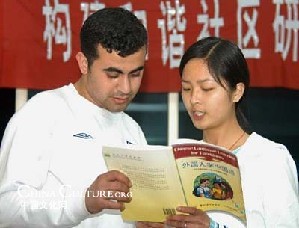| Home > Living in China > Custom |
Chinese----Getting more and more popular in the world
 |
Though notoriously hard to learn, Mandarin sees increasing interest from passionate overseas learners. Laying aside all the complex factors,Mandarin is apparently more than a mere language, shows a recent research.
Music to the ears
Mandarin, the official national standard spoken language of China, baffles most foreigners. Scientists have discovered it puzzles human brains too. Brain initially takes lexical tone, or pitch of words,for music, and lets its right side dominate the cognitive processing of the tone, according to a latest study by Chinese scientists.
The "error" takes place about 200 milliseconds after the ear catches the sound. After that flash moment, the left side of the brain takes over the control of processing the tone-carried meaning. The finding suggests that Chinese people might use right brain more often than westerners do while listening to their native tongue.
Mandarin is musical in nature. Each syllable in the Chinese language is pronounced in one of the four lexical tones associated with different meanings. For example, the syllable "bai" can be read out in four tones to represent four different words that respectively mean "split", "white", "swing" or "defeat".
In most western languages, such as English, changes in intonations imply differences in a statement or question, or change of mood. However, the meaning of the words remains unchanged.
It means when perceiving lexical tones of Mandarin,the brain avails itself to acoustic features immediately to decide where the signals should go. Then quickly, the brain finds it has made a "mistake" as the signals actually carry meanings. The brain will correct itself and dispatch the signals from the right side to the left.
More brainpower
British researchers have also found that people speaking Mandarin use both sides of their brains to understand the language. This makes a striking contrast with English speakers who only use one side of their brains.
The researchers found the left temporal lobe, located at the left temple, becomes active when English speakers hear English. They detected,however, both their left and right temporal lobes turn active when hearing Mandarin.
Mandarin is a notoriously difficult language to learn. Unlike English, speakers use intonations to distinguish different meanings of specific words. The researchers believe it necessary to interpret intonations tho show why Mandarin speakers must use both sides of their brain.
Higher IQ promoted
Chinese characters are pictographic and ideographic in design. People learning Mandarin will have their IQ improved. It is testified by results of German researchers, who encourage their children to learn Mandarin to improve IQ.
Another report claim Chinese, Korean and Japanese people have very high IQ on average. It is partly attributed to the fact they have Chinese characters in the languages. Mandarin is also a very precise language. With only 3,500 core characters, Mandarin constitutes over 1,000,000 words with meanings closely associated with basic characters.
Worldwide favor
Despite pros and cons, more and more people are learning Mandarin all over the globe. In the UK, university students are choosing a Chinese language courses which they believe beneficial to future careers. Same stories go around the world from the US to Thailand and Belgium.
UK has 25 universities offering Chinese courses. More than 400 high schools and elementary schools have set up Chinese language courses in the country.
In the US, an annual conference on Chinese language education has been held in Chicago in recent years. More than 300 Chinese language educators from around the country attend the meeting.
In Thailand, officials and educators from China and Thailand gathered in Bangkok to celebrate the 20th anniversary of the founding of the Chinese Language Schools Association in Thailand.
In Belgium, a Chinese speaking contest entitled "China and I " was held in Brussels last weekend. Twenty finalists battled it out, displaying their eloquence and understanding of the language. The oldest participant was 70 years old, and the youngest only eight.
Art
 more
moreChinese Traditional Art---- Xihe
Famous Star of Xihe Dagu---Yangyaqin Xihe

The Romance of butterfly lovers

Introduction to Suzhou Embroidery
Suzhou embroidery-one of China's four famous embrodiery styles, has a

Customs
 more
more



 print
print  email
email  Favorite
Favorite  Transtlate
Transtlate 